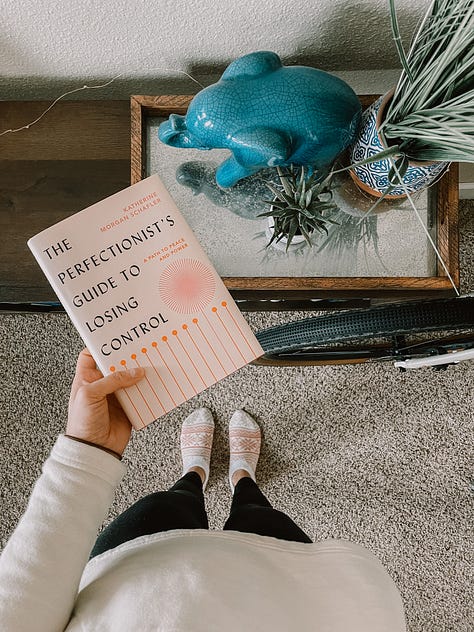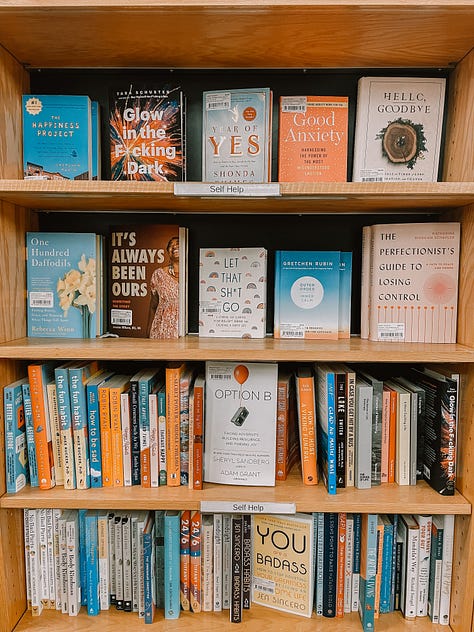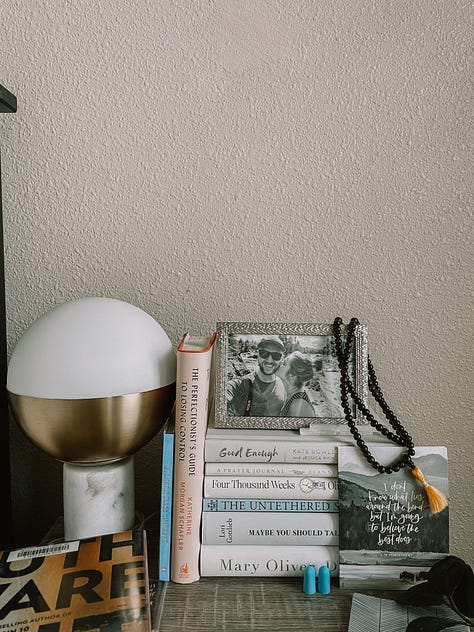I believe that some (most) books show up for us (seek us out) at the exact moment we need to find them. This belief is one of the most “woo-woo” things about me, something that people may roll their eyes at and brush off without listening to my reasoning. I actively evangelize about very little beyond what’s in my Instagram bio (snail mail, books, Hamilton) — I lean more toward a “you do you!” mentality for most things in life. However, I will *never!* (emphasis added) give up trying to convince you to believe in the power of trusting a book’s timing.
The Perfectionist’s Guide to Losing Control was a reminder of that power.



A friend asked if I wanted to go to a bookstore. I did. They had a specific book in mind to find, and while searching, we came across this one. It was at eye level, the cover fully displayed on the shelf (not tucked in vertically so as to hide from me). I read the title and let out what I can only describe as a guffaw. I read the inside cover and went silent — my guffaw, which meant: “Oh my, this is so me!” transformed into a very different, quiet, “Oh…my. This is so me.”
I grabbed it off the shelf.
You see, I have been on a bit of a quest for what this title proclaims. Call it losing control, call it letting go, call it holding things lightly — I’ve been hunting that down for the last several months. My chosen word for 2023 is “flow,” another extension of this vision. Picture a river, moving along in its natural state. It doesn’t check the clock to make sure it’s moving at the right pace, it doesn’t circle back to overthink how it moved a few feet back, and it doesn’t hurry. That’s what I wanted. That’s not at all what I had.
I was making checklists of the perfect routine to adhere to in order to relax more. I was making up to-do list items to add to my checklists, tricking myself into believing those would allow me to loosen my grip when they really added more stress. I played through countless iterations of “If I do this, then I will be that” in my head (and in reality). I was hard-knuckling my way toward things like rest, relaxation, and acceptance of what is — things that, I’m still learning, require the exact opposite (and no knuckles).
It was not working well.
The author, Katherine Morgan Schafler, encourages readers to notice the tendencies like these that can come with perfectionism — like how we want to take on the “project” of fixing ourselves and create a perfectly-curated checklist to get ourselves closer to balance or forgiveness or acceptance (a literal example from her book and, well, *ahem*, my life). How even though we try to control our way through our days and weeks, she lovingly reminds us: That’s just not how it works in this world.
I loved The Perfectionist’s Guide to Losing Control because it met me where I’m at in this journey — and reminded me that perfectionism doesn’t have to be a dirty word. Morgan Schaffler says that “perfectionism invites a deep, unending exploration of who you are and what you most desire from this life.” All those checklists and to-do list items? They were trying to point me toward what I needed and wanted but wouldn’t let myself have without earning it: rest, calm, and a new way of working. They weren’t quite the right path toward that vision, but they did help me name some of those desires.
She shouts from her pages that perfectionism is not something to solve or fix within us, but something to use as a way toward our truest selves and live our truest lives. That we are whole and perfect as we are. That we deserve rest just because we do. And with that, we all can let out the breath we didn’t know we’d been holding.
This book grabbed my attention on the shelf — and then my heart — at a time when it needed a gentle shaking, some firm reminders, and I believe I will never be the same because of it.



